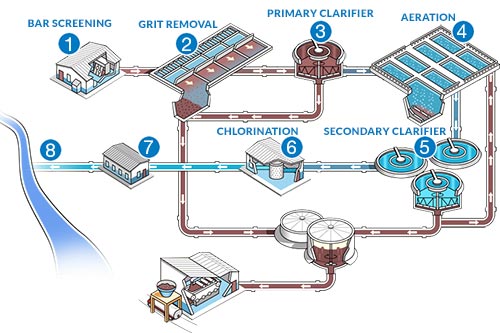
Importance of Water Treatment in Industrial Facilities
Water is an essential resource and it is important for industrial facilities to treat their water responsibly. Proper water treatment is essential for industrial facilities to stay compliant with environmental regulations, reduce costs and maximise efficiency.
Water treatment helps to ensure that the water used in industrial processes is of the highest quality. It can also help to protect the environment from potential pollutants by removing potential contaminants from industrial waste-waters. Additionally, effective water treatment can help to reduce the cost of running a facility by decreasing water use, avoiding costly repairs and improving overall energy efficiency. By properly treating their water, industrial facilities are able to remain compliant with all regulations, reduce costs and optimise efficiency.
In this blog post, we will discuss the importance of water treatment in industrial facilities and the role it plays in ensuring that water is being used responsibly. We will look at the various methods used in water treatment, the benefits they provide, and how they can help facilities stay compliant and remain cost-effective.
1. Protects Industrial Equipment from Damage
Water treatment is of utmost importance in industrial facilities, as it helps protect industrial equipment from damage. Unfiltered water can contain substances that can cause corrosion, which could reduce the lifespan of equipment or cause it to malfunction. Industrial Water treatment helps remove these substances, extending the life of the equipment and saving money in the long run. In some cases, it can also reduce the amount of energy needed to operate the equipment, thus saving additional money.
2. Removes Toxins from Water
Water treatment is a vital part of any industrial facility, as it helps to remove toxins that can be harmful to both the environment and people. One of the most important elements of water treatment is the removal of toxins from water. By using a variety of techniques, such as filtration, ion exchange, reverse osmosis, and ultraviolet light, industrial facilities can remove dangerous toxins from their water sources. This helps to ensure the safety of the environment and of people who come in contact with the water. Additionally, removing toxins from water can also improve the taste and odour of the water, making it more enjoyable for people who use it.
3. Prevents Corrosion and Scaling
The third major benefit of water treatment in industrial facilities is that it prevents corrosion and scaling. The accumulation of rust and scale in a system can lead to decreased efficiency, higher energy costs, and system downtime. By properly treating the water, these risks can be reduced. Water treatment can also improve the longevity of your pipes and other equipment by preventing corrosion and scaling. This preserves the quality of the equipment and keeps it running at optimal levels for a longer period of time.
4. Reduces Energy Costs
One of the key benefits of water treatment in industrial facilities is the reduction of energy costs. By removing impurities from the water, industrial water treatment systems enable equipment to run more efficiently, resulting in lower energy bills. Additionally, water treatment can help increase the life cycle of cooling towers and other equipment, as well as reduce the need for maintenance and repairs. Not only does this save money on energy costs, but it can also significantly reduce downtime, which can result in lost revenues.
5. Ensures Compliance with Environmental Regulations
Ensuring compliance with environmental regulations is a critical aspect of water treatment in industrial facilities. With the risk of pollutants entering waterways and affecting ecosystems, it is essential that water treatment processes are conducted with the utmost care. Waste water must be treated to remove hazardous substances, such as ammonia, nitrates, and sulphur, in order to meet the standards set by the Environmental Protection Agency. Additionally, the treated water must be regularly tested to ensure that it meets the requirements set by the EPA. Having a well-maintained water treatment system helps ensure that industrial facilities are compliant with the regulations set by the government and helps protect the environment.
In conclusion, water treatment is important for industrial facilities. It helps to ensure that the water used is safe and free of contaminants and pollutants. Proper water treatment helps to reduce the risk of environmental pollution, reduce the costs associated with wastewater treatment, and improve the efficiency of operations. Proper water treatment also helps to reduce the amount of hazardous chemicals and materials entering the environment, which can lead to long-term health and safety risks. By understanding the importance of water treatment, industrial facilities can ensure that the water they use is safe, efficient, and free from contaminants.

Comments (0)